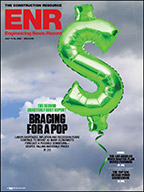As the Bush administration prepares to seek $1.7 billion more to carry out a revised plan to continue reconstruction in Iraq, some in the Senate want more information and assurances before they endorse additional funds.
The administration’s new approach is clear. “We’re getting out of the reconstruction business in Iraq,” David M. Satterfield, U.S. Dept. of State coordinator for Iraq, told a Senate Foreign Relations Committee hearing on Jan. 25. In early phases, mostly financed by the $20.9-billion Iraq Relief and Reconstruction Fund, contracts were big and many went to large U.S. firms. Recently, however, officials have shifted more contracts to local companies. Satterfield says about 80% of recent U.S.-funded work has gone to Iraqi firms.
“It’s not going to be big-ticket reconstruction anymore,” he says. “It’s going to be small projects, micro-enterprise lending, job generation.” A main focus of the revised strategy, which President Bush announced Jan. 10, is Provincial Reconstruction Teams, State Dept.-led groups that provide small loans, grants and other assistance to create jobs and build Iraqi government capabilities. Satterfield says the plan is to double the number of PRTs to 20 by year’s end. But that hinges on how much aid Congress approves and the situation in Iraq.
The Dept. of State has some money available to launch the program but will seek $538 million through a continuing spending resolution "to avoid a shutdown of mission-critical programs,” Satterfield adds.
Bush also will ask for $1.2 billion more for Iraq rebuilding in a supplemental request, says Sen. Richard Lugar (Ind.), the Foreign Relations Committee’s top Republican. Of that, $414 million would be for PRTs, $350 million for the Commander’s Emergency Response Program, which funds small projects in Iraq, and $400 million for a “civilian version of CERP,” Lugar says. DOD already has $500 million in 2007 CERP appropriations.
Committee Democrats want to be assured the new program will be managed well. Chairman Joseph Biden (D-Del.) says he’s skeptical about providing more money “without much, much, much harder data, much tighter reasoning and much closer oversight” of the program.


Post a comment to this article
Report Abusive Comment